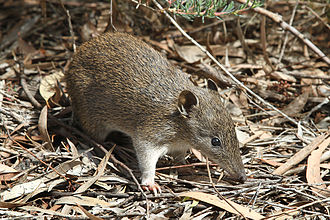Plight of the bandicoot in prime-time spotlight
 Channel 9's Saturday night news听featured the听 an endangered species with populations across the Adelaide Hils and Mount Lofty Ranges.
Channel 9's Saturday night news听featured the听 an endangered species with populations across the Adelaide Hils and Mount Lofty Ranges.Habitat preservation is key to the survival of the bandicoot.听But the habitat of this native marsupial听poses a problem to both residents of the Adelaide Hills and conservationists. Bandicoots thrive around private homes and gardens, and surprisingly, amongst invasive non-native species.
The Environment Institute, the (DEWNR) and the (PIRSA) have been working collaboratively on research that shows that bandicoots depend upon the non-native blackberry shrub for food and shelter.听However, the blackberry has been listed as invasive pest in the Adelaide Hills region.
The research was听,听led by听.
Recently, proposals have been put forth to clear land in the Adelaide Hills region,听removing vital vegetation for the bandicoot.听Efforts to protect the bandicoot have been bolstered by support from the听听(厂鲍搁尝骋).
The future of bandicoot survival is further threatened by the creature鈥檚 inability to find mates in distant locations. Our research, led by Professor Steven Cooper, , uncovered the need for genetic diversity to sustain future populations. An ongoing proposal for a aims to address this concern. The proposed tunnel would cross underneath Upper Sturt Road to connect bandicoot populations in Belair National Park and Mark Oliphant Conservation Park, thereby facilitating breeding.
The news segment appeared on Channel 9 on 29 October, 2016

Newsletter & social media
Join us for a sensational mix of news, events and research at the Environment Institute. Find out about听new initiatives and听share with your friends what's happening.
听听听
